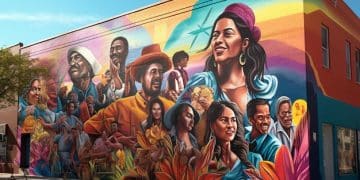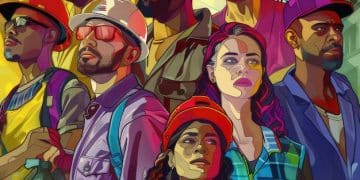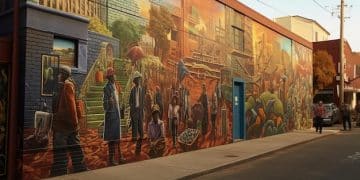Hip Hop Activism 2025: Artists Driving Social Change
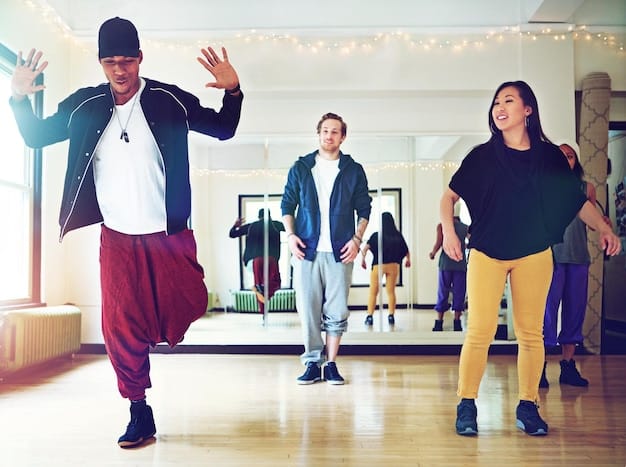
The evolving landscape of hip hop activism in 2025 sees artists leveraging their amplified platforms and innovative digital strategies to champion social justice, addressing systemic inequalities and influencing policy through direct engagement, advocacy, and collaborative community initiatives.
In an era defined by rapid technological advancement and persistent social challenges, Hip Hop Activism: How Artists Are Using Their Platforms to Drive Social Change in 2025 stands as a powerful testament to the genre’s enduring commitment to community and justice. From its foundational roots in urban protest to its global influence today, hip hop continues to be a crucial voice for the voiceless, adapting its strategies to meet the demands of a new decade.
The Evolving Landscape of Hip Hop Activism
The role of music in social movements is not new, but hip hop’s unique position as both cultural barometer and agent of change distinguishes it profoundly. By 2025, the strategies employed by artists to drive social change have evolved significantly, moving beyond simple lyrical content to encompass sophisticated digital campaigns, direct political engagement, and tangible community investments. This evolution reflects a growing maturity within the genre, recognizing that influence extends far beyond record sales.
Artists are now more acutely aware of their power to shape narratives and mobilize masses. The immediate feedback loops offered by social media platforms mean that messages of activism can resonate globally within moments, transforming local issues into international dialogues. This unprecedented reach demands a more nuanced approach, balancing artistic expression with strategic advocacy.
Digital Tools and Amplified Voices
The digital age has provided hip hop activists with an expansive toolkit, enabling them to disseminate information, organize movements, and raise awareness with unparalleled speed. No longer confined to traditional media, artists are exploiting every facet of the online world to amplify their messages and connect directly with their audiences.
- Influencer marketing for social causes: Artists collaborate with non-profits, using their social media presence to endorse and fundraise for critical issues.
- Interactive fan engagement: Live streams, Q&A sessions, and virtual town halls allow for direct dialogue on societal problems, fostering a sense of collective responsibility.
- Data-driven campaigns: Leveraging analytics to understand audience demographics helps tailor messages for maximum impact and engagement on specific social issues.
This digital dexterity ensures that activism is not just passively consumed but actively engaged with, turning listeners into participants. From viral challenges promoting voter registration to curated playlists highlighting songs about police brutality, the digital realm is a dynamic arena for change.
Furthermore, the rise of Web3 technologies, including NFTs and DAOs, offers new avenues for financial independence and community-led initiatives, potentially decentralizing power structures within the music industry and empowering artists to fund their social causes directly.
Beyond the Mic: Direct Action and Policy Influence
Increasingly, hip hop artists are not just rapping about change; they are actively orchestrating it. Their influence extends to legislative chambers, community centers, and educational institutions, demonstrating a commitment to systemic transformation rather than just symbolic gestures.

Many artists have established their own foundations and non-profit organizations, channeling resources directly into underserved communities. These initiatives often focus on educational programs, economic empowerment, and criminal justice reform, addressing the root causes of inequality. The shift from mere philanthropy to sustained, strategic investment is a hallmark of contemporary hip hop activism.
The integration of artists into policy discussions is also noteworthy. Lobbying efforts, testimonies before legislative bodies, and direct consultations with lawmakers illustrate their growing political savvy. This engagement ensures that the perspectives of marginalized communities, often articulated through hip hop, are represented in policy-making processes.
The evolving landscape of hip hop activism in 2025 is thus characterized by a multi-faceted approach: leveraging digital tools for mass mobilization, engaging directly in policy debates, and investing tangibly in community development. Artists are not just commentators; they are architects of change.
Key Themes and Issues Addressed by Artists
In 2025, hip hop artists continue to tackle a broad spectrum of critical social issues, often reflecting the ongoing challenges faced by communities globally. While some themes remain perennial, new areas of focus emerge as societal dynamics shift and global crises unfold.
Racial Justice and Systemic Inequality
Racial justice remains a cornerstone of hip hop activism. Artists consistently use their platforms to denounce systemic racism, police brutality, and the disproportionate impact of discriminatory policies on minority communities. The persistent struggle for equality continues to inspire powerful narratives and calls to action.
- Challenging discriminatory practices: Through lyrics, documentaries, and public statements, artists expose and condemn instances of racial bias in housing, employment, and education.
- Advocating for police reform: Many artists are vocal proponents of police accountability, demilitarization, and community-led policing initiatives, frequently collaborating with civil rights organizations.
- Promoting Black economic empowerment: Encouraging and investing in Black-owned businesses, fostering financial literacy, and advocating for equitable access to capital are key components of this activism.
The conversation around racial justice has also broadened to include intersectionality, recognizing how race intersects with gender, sexuality, and class to create unique forms of oppression. This nuanced understanding enhances the depth and impact of the activism.
Mental Health Awareness
The growing emphasis on mental health awareness within hip hop is a significant development. For years, discussions around mental well-being were often stigmatized in many communities. Now, artists are openly sharing their struggles, normalizing therapy, and advocating for accessible mental health services.
This includes addressing issues like depression, anxiety, trauma, and the specific mental health challenges faced by underprivileged communities. By destigmatizing these conversations, artists are encouraging their fans to seek help and fostering a culture of vulnerability and support.
Environmental Justice and Climate Change
While perhaps less overtly visible than other issues, environmental justice is gaining traction within hip hop. Artists are increasingly highlighting how climate change and environmental degradation disproportionately affect marginalized communities, often due to historical industrial pollution and lack of infrastructure.
This activism manifests in supporting clean energy initiatives, advocating for environmental clean-up in urban areas, and raising awareness about sustainable living practices. It’s a recognition that social justice is intrinsically linked to environmental health, particularly for those living in frontline communities.
From the enduring fight for racial justice to the burgeoning focus on mental health and environmental equity, hip hop artists in 2025 are demonstrating a comprehensive commitment to social good. Their ability to connect these diverse issues illustrates their understanding of the complex web of societal challenges.
Artist Spotlights: Voices Leading the Charge
The power of hip hop activism is best illustrated through the artists themselves—individuals who have transcended entertainment to become formidable agents of change. In 2025, several prominent figures and rising stars continue to exemplify this commitment.
Veteran Voices and Enduring Impact
Established artists, many of whom have been advocating for decades, continue to lend their gravitas and extensive networks to social causes. Their longevity in the industry provides them with unparalleled platforms and a deep understanding of systemic issues.
These veterans often focus on sustainable long-term projects, mentorship programs, and policy reform. Their influence extends beyond their music into various spheres, including business, education, and politics, making them formidable forces for good. Their activism is often characterized by strategic partnerships and a focus on generational impact.
The New Wave: Innovators and Digital Natives
A new generation of hip hop artists, often digital natives, are redefining activism with fresh approaches and an intimate grasp of contemporary communication channels. They are not only using their music to convey messages but are also engaging with fans in real-time through social media, streaming platforms, and gaming ecosystems.
- Micro-activism: Leveraging their large followings for targeted, short-term campaigns, like amplifying specific victim stories or promoting immediate donation drives for causes.
- Collaborative content: Working with activists, academics, and other artists to create educational content and multimedia projects that break down complex social issues for wider audiences.
- Authentic personal narratives: Sharing their own experiences with injustice or societal challenges, creating relatable content that fosters empathy and encourages dialogue among their audience.
These artists often utilize platforms like TikTok, Instagram Reels, and Twitch for immediate, impactful communication, turning their fan bases into active communities for social action. Their activism is often more spontaneous and responsive to current events.
Global Reach and Cross-Cultural Solidarity
The global nature of hip hop means that activism extends far beyond borders. Artists are increasingly collaborating internationally, addressing universal themes of oppression, poverty, and human rights. This cross-cultural solidarity strengthens movements and highlights shared struggles across different societies.
From supporting protests in other countries to raising awareness about humanitarian crises, hip hop artists are demonstrating collective responsibility on a global scale. This global network allows for the rapid sharing of strategies, resources, and solidarity, amplifying the overall impact of their efforts.
The diverse landscape of hip hop artists leading social change in 2025 showcases a blend of seasoned wisdom and youthful innovation. Their combined efforts highlight the genre’s unparalleled ability to connect, inspire, and mobilize diverse communities worldwide for a common purpose.
Challenges and Criticisms Faced by Activist Artists
While the impact of hip hop activism is undeniable, artists engaging in social change face a unique set of challenges and criticisms. Navigating these obstacles requires resilience, strategic thinking, and an unwavering commitment to their causes.
Authenticity and “Woke-Washing”
One of the persistent criticisms leveled at activist artists is the question of authenticity. In an era where social causes can be commodified, there’s a delicate balance between genuine advocacy and perceived “woke-washing”—where artists align with social issues primarily for public relations or commercial gain.
This scrutiny often leads to questions about an artist’s personal conduct, consistency of message, and the extent of their financial contribution to the causes they champion. Maintaining credibility requires transparency and a demonstrated, long-term commitment to activism, going beyond mere performative allyship.
Commercial Pressures and Industry Pushback
Artists engaged in activism often face commercial pressures from record labels, sponsors, and even audiences who prefer apolitical entertainment. Speaking out on controversial issues can alienate certain fan bases or lead to reduced endorsements, posing a financial risk.
The industry itself, often driven by profit motives, may be reluctant to support artists whose messages are deemed too radical or divisive. This can result in limited marketing budgets, fewer performance opportunities, or even subtle censorship, forcing artists to choose between their art and their advocacy.
Risk of Retribution and Personal Safety
Perhaps the most severe challenge is the risk of retribution. Artists who speak out against powerful institutions, political figures, or social injustices can face severe backlash, ranging from online harassment and smear campaigns to legal threats or even physical danger.
For artists from marginalized communities, these risks are often heightened, as they may already be targets of systemic oppression. Ensuring their safety and security, as well as providing legal and emotional support, becomes a crucial, yet often overlooked, aspect of their activist journey.
From questions of authenticity and commercial constraints to the very real threats to their personal safety, hip hop artists engaged in social change operate within a complex and often hostile environment. Their continued dedication in the face of these challenges underscores the depth of their commitment to justice.
Measuring Impact and Future Directions
Assessing the true impact of hip hop activism is a complex endeavor, requiring more than just anecdotal evidence. In 2025, efforts are being made to develop more robust metrics and to project the future trajectory of this powerful cultural force.
Quantifying Change and Engagement
Measuring the success of activist initiatives goes beyond traditional music metrics. It involves tracking tangible outcomes such as voter registration increases following artist endorsements, legislative changes influenced by advocacy campaigns, and the direct impact of community programs funded by artists.
Digital engagement metrics, like campaign reach, hashtag virality, and online discussion sentiment, provide insights into public awareness and mobilization. Surveys and qualitative studies help understand shifts in public opinion and behavioral changes influenced by hip hop’s messaging.
- Voter registration and turnout spikes among youth and marginalized communities post-campaigns.
- Direct financial contributions to social justice organizations and community development projects.
- Policy changes or legislative proposals influenced by artists’ advocacy and public pressure.
While causality can be difficult to prove definitively, a correlation between artist activism and positive social outcomes is increasingly evident, thanks to more sophisticated data analysis and interdisciplinary research.
Building Coalitions and Intergenerational Dialogue
The future of hip hop activism increasingly depends on building stronger coalitions, both within the hip hop community and with external allies. This includes fostering intergenerational dialogue between veteran activists and emerging artists, ensuring the transfer of knowledge and experience.
Collaborations with academic institutions, think tanks, and established non-profits can provide artists with research, strategic guidance, and greater legitimacy in policy discussions. These partnerships allow artists to focus on their strengths—communication and mobilization—while benefiting from the expertise of specialized organizations.
The creation of formal networks and alliances among activist artists can amplify their collective voice, provide mutual support, and facilitate the sharing of best practices, creating a more unified and impactful movement.
Leveraging Technology for Deeper Engagement
Looking ahead, technological advancements will continue to reshape hip hop activism. Beyond current digital tools, emerging technologies like augmented reality (AR) and virtual reality (VR) could offer immersive experiences that transport audiences directly into the heart of social issues, fostering deeper empathy and understanding.
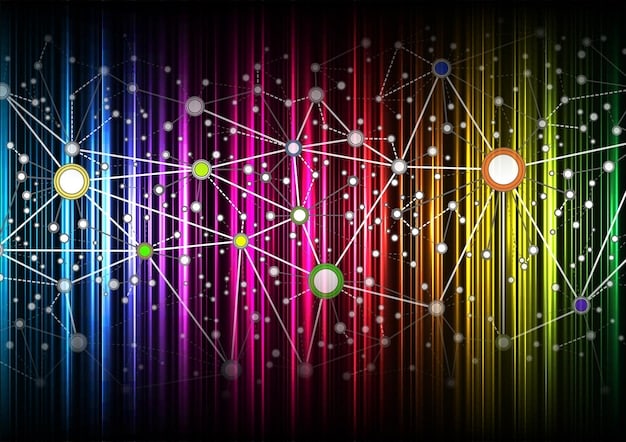
AI-driven analytics could help identify emerging social trends, predict community needs, and optimize campaign strategies for maximum impact. The future may also see more personalized forms of activism, where audiences are directly matched with causes aligned with their values, facilitated by algorithmic recommendations.
The measurement of impact in hip hop activism is evolving towards more data-driven and collaborative approaches. The future promises continued innovation, with technology serving as a powerful enabler for deeper engagement and more effective advocacy, ensuring that hip hop remains at the forefront of social change.
The Role of Fan Engagement in Activism
The effectiveness of hip hop activism is not solely dependent on the artists themselves; it is significantly amplified by the engagement of their fan bases. In 2025, fans are not just passive consumers of music but active participants in the social change movements championed by their idols.
From Listener to Advocate: Mobilizing the Base
Artists actively cultivate and mobilize their fan bases, transforming listeners into advocates for social justice. This shift from passive consumption to active participation is critical, as it extends the reach and impact of activist messages far beyond the artist’s immediate platform.
- Call-to-action campaigns: Artists issue clear, actionable directives—like signing petitions, contacting legislators, or attending rallies—which their fans readily adopt.
- Digital grassroots organization: Fans often self-organize online, creating fan-led initiatives that complement and extend the artist’s activism, forming powerful distributed networks.
- Educational dissemination: Inspired by artists, fans share educational resources, breaking down complex social issues into digestible formats that resonate within their social circles.
The trust and loyalty fans have towards their favorite artists often translate into a willingness to engage politically and socially. This “multiplier effect” means that a single artist’s message can quickly cascade through millions of individual networks, creating widespread awareness and action.
Creating Communities of Conscience
Beyond individual actions, artist activism fosters the creation of “communities of conscience” among fans. These are spaces, often online, where individuals can discuss social issues, share perspectives, and collectively advocate for change without fear of judgment.
These communities provide a crucial support system for individuals engaged in social justice work, offering both emotional solidarity and practical resources. The shared passion for hip hop, combined with a commitment to social progress, creates a powerful bond that transcends geographical boundaries.
Artists frequently facilitate these community spaces, hosting forums, organizing virtual meet-ups, or even establishing dedicated platforms where fans can connect directly with each other and with the causes at hand. This cultivation of community turns abstract ideas of justice into tangible, collective efforts.
Feedback Loops and Reciprocal Influence
The relationship between artists and fans in activism is not a one-way street. There’s a significant feedback loop where fan engagement and the issues they highlight can, in turn, influence the artist’s next steps and areas of focus. This reciprocal influence keeps the activism relevant and responsive to grassroots concerns.
Artists often draw inspiration from the lived experiences of their fans, incorporating these narratives into their music and advocacy. Fan feedback on the efficacy of certain campaigns or the urgency of particular issues can prompt artists to pivot their strategies, making the activism more agile and impactful.
The role of fan engagement in hip hop activism is paramount, transforming the audience from mere spectators into vital participants. This symbiotic relationship between artists and their dedicated followers amplifies the reach, depth, and sustainability of social change efforts, proving that collective action is the heart of true progress.
Looking Ahead: The Future of Hip Hop Activism
As we delve deeper into the 2020s, the trajectory of hip hop activism appears set for continued evolution and increased sophistication. The genre’s inherent adaptability and its deep roots in social commentary suggest a future where its influence on systemic change will only grow more profound.
Integration with Global Movements
The future will likely see hip hop activism becoming even more seamlessly integrated with global social and political movements. As shared challenges like climate change, economic inequality, and human migration become more pronounced, hip hop artists will increasingly find common ground with advocates worldwide.
This integration will manifest in multi-national collaborations, shared digital campaigns that transcend language barriers, and a more pronounced presence of hip hop voices in international forums and summits dedicated to global issues. The universal language of rhythm and protest will continue to bridge divides.
Sustainable Impact and Institutionalization
There’s a growing recognition within the hip hop community that activism needs to move beyond reactive responses to crises, towards sustainable, institutionalized change. This involves establishing more permanent non-profit organizations, educational curricula, and policy advocacy groups led by or heavily influenced by hip hop artists.
The goal is to create enduring structures that can continue to drive change even as artists’ individual careers ebb and flow. This institutionalization ensures that the fight for justice, inspired by hip hop’s ethos, becomes a permanent fixture in the social landscape rather than a series of isolated campaigns.
Furthermore, artists will likely invest more in long-term capacity building within communities, empowering local leaders and organizations to sustain their own advocacy efforts. This approach emphasizes self-sufficiency and communal resilience, shifting from top-down charity to grassroots empowerment.
Leveraging AI and Data for Targeted Action
Artificial intelligence and advanced data analytics are poised to play a greater role in refining activist strategies. AI could help artists identify optimal times and platforms for messaging, predict the effectiveness of different approaches, and even personalize calls to action for individual fans based on their interests and engagement patterns.
For example, AI could analyze public sentiment around a specific issue, helping artists craft more resonant messages. Data mining could identify underserved communities most in need of specific interventions, guiding philanthropic efforts with greater precision.
The future of hip hop activism is dynamic and promising. From deeper global integration and the establishment of sustainable change mechanisms to the strategic leverage of cutting-edge technology, hip hop’s role as a catalyst for social progress will continue to strengthen and adapt, proving its enduring relevance as a voice for justice in a rapidly changing world.
| Key Aspect | Brief Description |
|---|---|
| 🎤 Platform Amplification | Artists leverage vast digital and traditional platforms to disseminate social justice messages globally. |
| ✊ Direct Action & Policy | Beyond lyrics, artists engage in lobbying, community investment, and direct influence on policy. |
| 💡 Key Issues Addressed | Focus on racial justice, mental health, and emerging environmental concerns within marginalized communities. |
| 🤝 Fan Mobilization | Fans are transforming into active advocates, amplifying messages and participating in grassroots efforts. |
Frequently Asked Questions About Hip Hop Activism
▼
Originally rooted in raw lyrical protest and local community engagement, hip hop activism by 2025 has significantly evolved. It now incorporates sophisticated digital strategies, direct policy engagement, strategic philanthropy, and global collaborations, moving beyond artistic expression to tangible societal impact.
▼
In 2025, hip hop artists are primarily focused on racial justice and combating systemic inequality, advocating for police reform and Black economic empowerment. They are also increasingly championing mental health awareness and environmental justice, especially concerning their disproportionate impact on marginalized communities.
▼
Artists use digital platforms by leveraging influencer marketing for causes, engaging fans through live streams and Q&A sessions, and employing data-driven campaigns to tailor messages. They create viral challenges for voter registration and utilize Web3 technologies for funding and community-led initiatives, greatly amplifying their reach.
▼
Activist artists face criticisms regarding authenticity or “woke-washing,” where their advocacy might be perceived as disingenuous. They also contend with commercial pressures from the industry, which may discourage controversial stances, and face personal risks including harassment, legal threats, and safety concerns due to their outspokenness.
▼
Fan engagement is crucial because it transforms listeners into active advocates. Fans amplify messages, organize grassroots efforts, disseminate educational content, and form “communities of conscience.” This creates a powerful feedback loop where fan issues influence artists, resulting in a more responsive and impactful collective movement for change.
Conclusion
The journey of hip hop activism from its nascent stages to its powerful manifestation in 2025 underscores a profound truth: music, at its core, can be a formidable engine for social change. Artists, armed with authenticity and innovative strategies, are not merely documenting the struggles of their communities; they are actively shaping the narrative, challenging injustices, and directly influencing policy. The genre’s unique ability to mobilize, educate, and inspire continues to push boundaries, demonstrating that art and advocacy are inextricably linked. As hip hop moves forward, its commitment to justice and its capacity to ignite meaningful action will undoubtedly remain central to its enduring legacy.

